2024年中考英语人教版新目标一轮复习教材梳理课件:第11讲 八年级下 Units 1~2 (共37张PPT)
文档属性
| 名称 | 2024年中考英语人教版新目标一轮复习教材梳理课件:第11讲 八年级下 Units 1~2 (共37张PPT) | 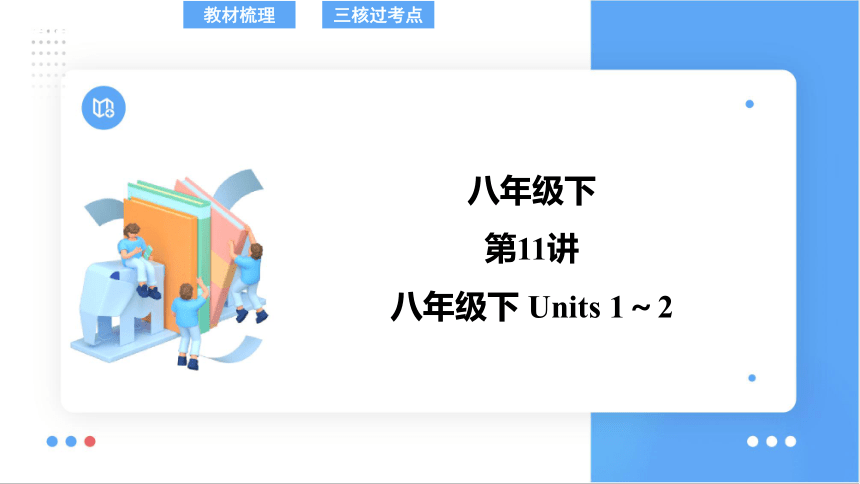 | |
| 格式 | pptx | ||
| 文件大小 | 861.4KB | ||
| 资源类型 | 教案 | ||
| 版本资源 | 人教新目标(Go for it)版 | ||
| 科目 | 英语 | ||
| 更新时间 | 2024-01-11 20:42:31 | ||
图片预览

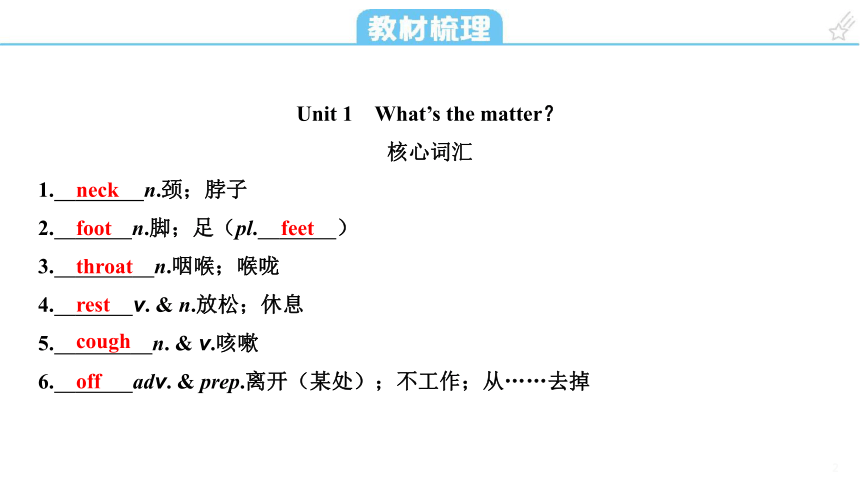
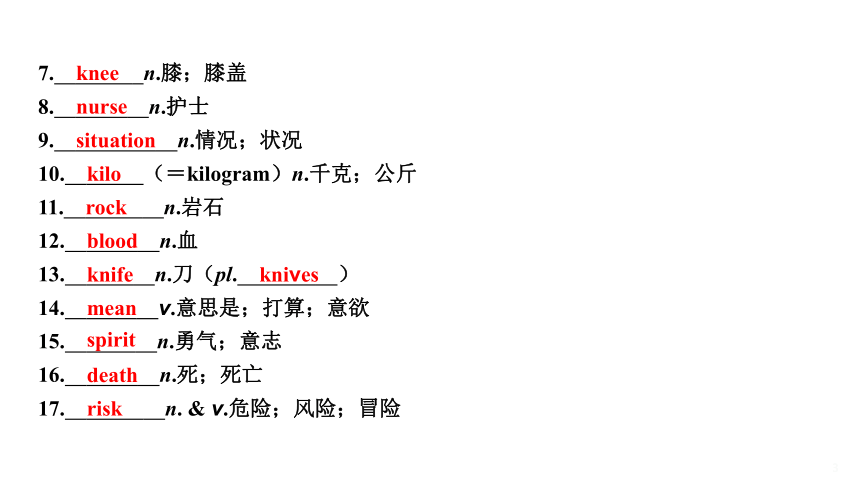
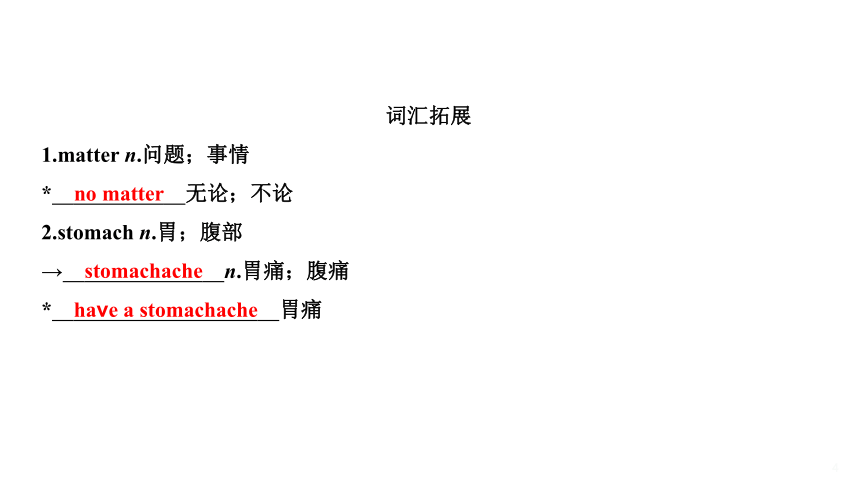
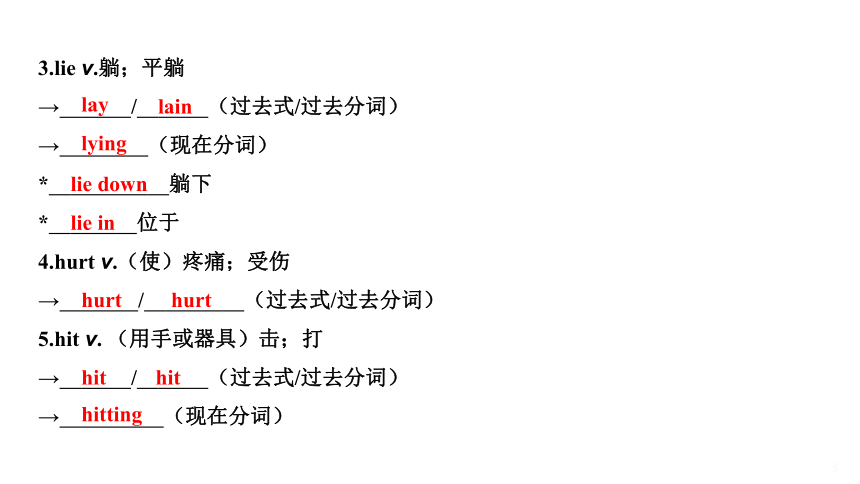
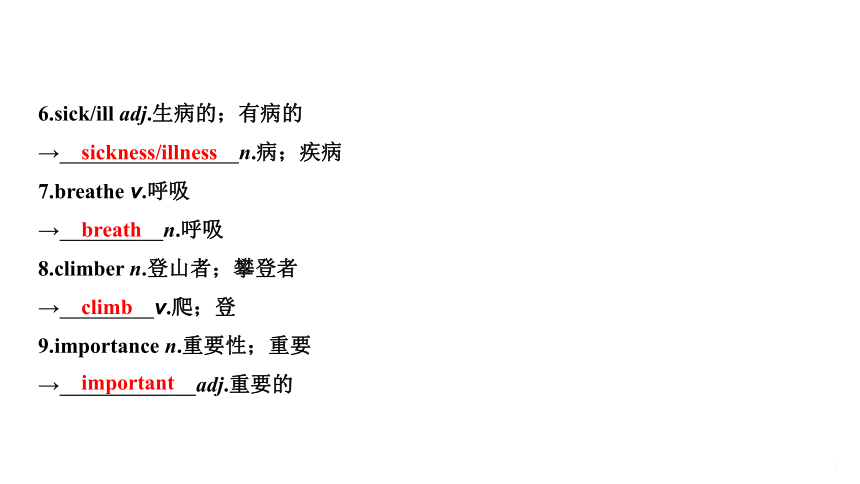
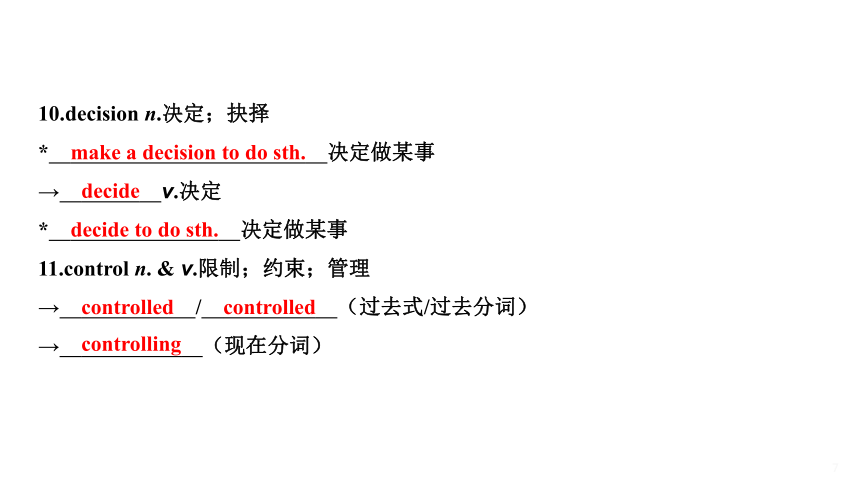
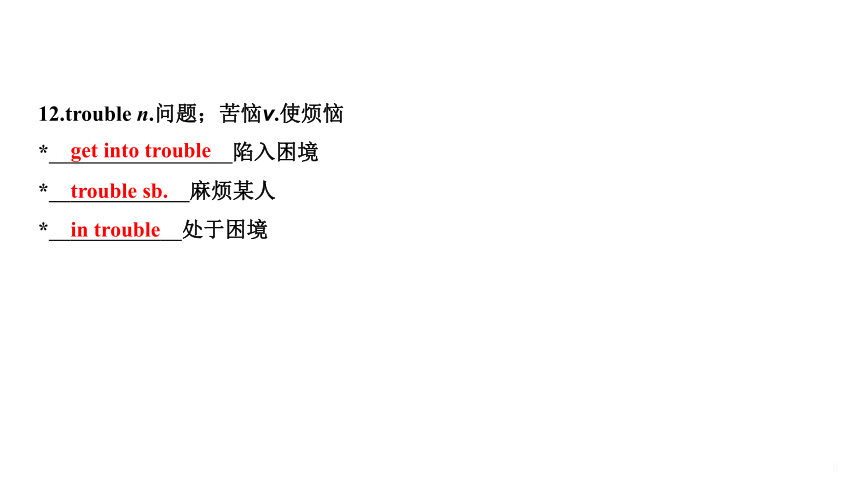
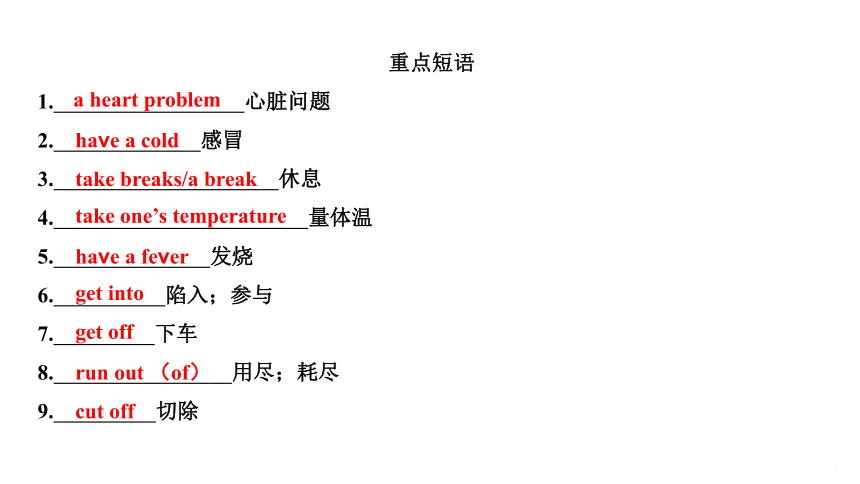
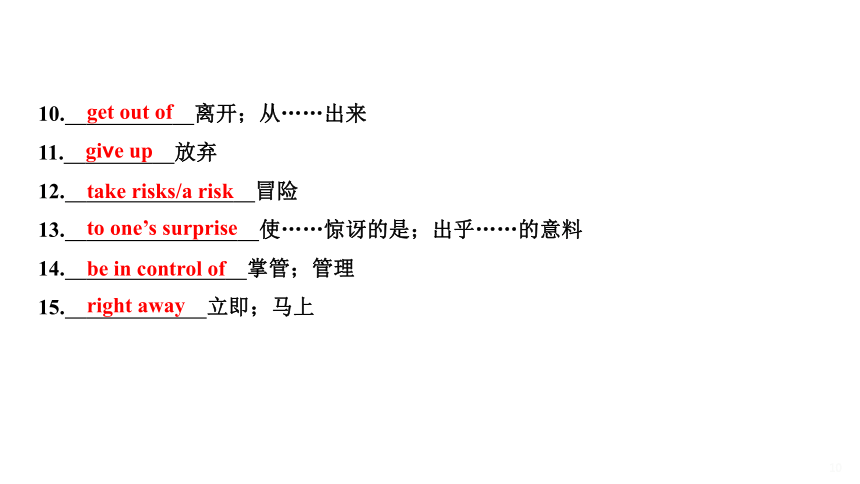
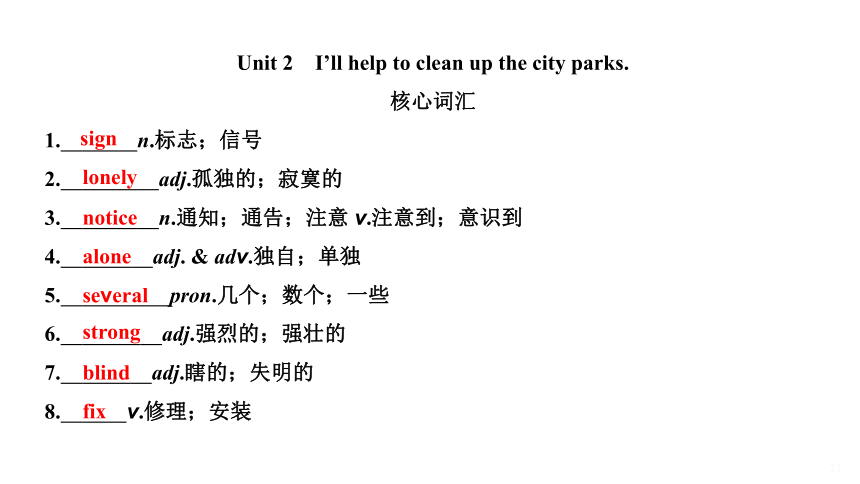
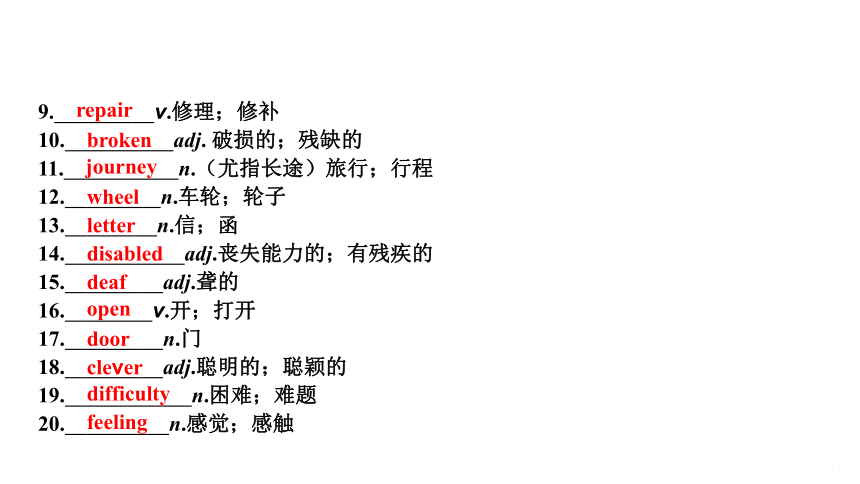
文档简介
(共37张PPT)
英语
八年级下
第11讲
八年级下 Units 1~2
教材梳理
三核过考点
Unit 1 What’s the matter?
核心词汇
1. washed n.颈;脖子
2. washe n.脚;足(pl. throat )
3. throat n.咽喉;喉咙
4. throat v. & n.放松;休息
5. cough n. & v.咳嗽
6. throat adv. & prep.离开(某处);不工作;从……去掉
neck
foot
feet
throat
rest
cough
off
7. throat n.膝;膝盖
8. nurse n.护士
9. situation n.情况;状况
10. throat (=kilogram)n.千克;公斤
11. throat n.岩石
12. blood n.血
13. knife n.刀(pl. throat )
14. mean v.意思是;打算;意欲
15. spirit n.勇气;意志
16. death n.死;死亡
17. throat n. & v.危险;风险;冒险
knee
nurse
situation
kilo
rock
blood
knife
knives
mean
spirit
death
risk
词汇拓展
1.matter n.问题;事情
* no matter 无论;不论
2.stomach n.胃;腹部
→ stomachache n.胃痛;腹痛
* have a stomachache 胃痛
no matter
stomachache
have a stomachache
3.lie v.躺;平躺
→ throa / throa (过去式/过去分词)
→ lying (现在分词)
* lie down 躺下
* lie in 位于
4.hurt v.(使)疼痛;受伤
→ throat / throat (过去式/过去分词)
5.hit v. (用手或器具)击;打
→ throa / throa (过去式/过去分词)
→ hitting (现在分词)
lay
lain
lying
lie down
lie in
hurt
hurt
hit
hit
hitting
6.sick/ill adj.生病的;有病的
→ sickness/illness n.病;疾病
7.breathe v.呼吸
→ breath n.呼吸
8.climber n.登山者;攀登者
→ climb v.爬;登
9.importance n.重要性;重要
→ important adj.重要的
sickness/illness
breath
climb
important
10.decision n.决定;抉择
* make a decision to do sth. 决定做某事
→ decide v.决定
* decide to do sth. 决定做某事
11.control n. & v.限制;约束;管理
→ controlled / controlled (过去式/过去分词)
→ controlling (现在分词)
make a decision to do sth.
decide
decide to do sth.
controlled
controlled
controlling
12.trouble n.问题;苦恼v.使烦恼
* get into trouble 陷入困境
* trouble sb. 麻烦某人
* in trouble 处于困境
get into trouble
trouble sb.
in trouble
重点短语
1. a heart problem 心脏问题
2. have a cold 感冒
3. take breaks/a break 休息
4. take one’s temperature 量体温
5. have a fever 发烧
6. get into 陷入;参与
7. get off 下车
8. run out (of) 用尽;耗尽
9. cut off 切除
a heart problem
have a cold
take breaks/a break
take one’s temperature
have a fever
get into
get off
run out (of)
cut off
10. get out of 离开;从……出来
11. give up 放弃
12. take risks/a risk 冒险
13. to one’s surprise 使……惊讶的是;出乎……的意料
14. be in control of 掌管;管理
15. right away 立即;马上
get out of
give up
take risks/a risk
to one’s surprise
be in control of
right away
Unit 2 I’ll help to clean up the city parks.
核心词汇
1. lonely n.标志;信号
2. lonely adj.孤独的;寂寞的
3. notice n.通知;通告;注意 v.注意到;意识到
4. alone adj. & adv.独自;单独
5. lonely pron.几个;数个;一些
6. strong adj.强烈的;强壮的
7. blind adj.瞎的;失明的
8. lonel v.修理;安装
sign
lonely
notice
alone
several
strong
blind
fix
9. repair v.修理;修补
10. broken adj. 破损的;残缺的
11. journey n.(尤指长途)旅行;行程
12. wheel n.车轮;轮子
13. letter n.信;函
14. disabled adj.丧失能力的;有残疾的
15. lonely adj.聋的
16. open v.开;打开
17. lonely n.门
18. lonely adj.聪明的;聪颖的
19. difficulty n.困难;难题
20. feeling n.感觉;感触
repair
broken
journey
wheel
letter
disabled
deaf
open
door
clever
difficulty
feeling
词汇拓展
1.cheer v.欢呼;喝彩
→ cheerful adj.令人愉快的
2.satisfaction n.满足;满意
→ satisfied adj.满意的;欣慰的
→ satisfy v.满足
* satisfy one’s need 满足某人的需要
* be satisfied with 对……感到满意
cheerful
satisfied
satisfy
satisfy one’s need
be satisfied with
3.joy n.高兴;愉快
→ joyful adj. 高兴的;令人愉快的
* to one’s joy 令某人高兴的是
4.owner n.物主;主人
→ lonely adj. & pron.自己的;本人的v.拥有
5.raise v.募集;征集
* raise money 筹钱
6.imagine v.想象;设想
→ imagination n.想象力;想象
joyful
to one’s joy
own
raise money
imagination
7.carry v.拿;提;扛
→ carried / carried (过去式/过去分词)
→ carries (第三人称单数)
* carry on 继续
* carry out 执行;实施
8.kindness n.仁慈;善良
→ lonely adj.善良的
9.understand v.理解;领会
→ understood / understood (过去式/过去分词)
carried
carried
carries
carry on
carry out
kind
understood
understood
10.volunteer v.义务做;自愿做n.志愿者
* volunteer to do sth. 志愿做某事
11.train v.训练;培训n.火车
→ training n.训练;培训
12.change v. & n.变化;改变
* change into 变成
volunteer to do sth.
training
change into
重点短语
1. cheer up (使)变得更高兴;(使)振奋起来
2. clean up 打扫(或清除)干净
3. cheer for sb. 为某人加油
4. come up with 想出;提出(主意、计划、回答等)
5. set up 建立;设立
6. used to 曾经……;过去……
7. care for 照顾;非常喜欢
8. give/hand out 分发
9. put off 推迟
cheer up
clean up
cheer for sb.
come up with
set up
used to
care for
give/hand out
put off
10. call up 打电话给(某人);征召
11. try out 参加……选拔;试用
12. take after (外貌或行为)像
13. fix up 修理
14. give away 赠送;捐赠
15. make a difference 影响;有作用
call up
try out
take after
fix up
give away
make a difference
mean的用法(Unit 1, P6)
一看全国视野(探考向)
(2023·江苏连云港改编) It is meaningful (mean) to do a survey on how to go green in the community.
meaningful
二理知识锦囊(累知识)
mean既可以用作动词,也可以用作形容词。主要用法如下:
(1)mean作形容词,意为“刻薄的;吝啬的”。
(2)mean的名词形式为meaning,意为“意义;意思”。“……是何意?”可表达为:
What do you mean by...?=What do/does ... mean?=What’s the meaning of...?
(3)meaninglessadj.无意义的;meaningfuladj.有意义的。
三测多维评价(练用法)
用括号内所给词的适当形式填空
1.I mean to travel (travel) to the beautiful city Lijiang during the coming summer vacation.
2.—Be careful, my dear. A small mistake means failing (fail) the exam.
—OK. I will.
to travel
failing
3.—I think success means working (work) hard.
—I agree. So we should never give up easily.
4.If we mean to help (help) people in need, we should find out what they need most.
5.If you don’t understand the meaning (mean) of the teacher’s words, you can just ask him to explain it once again.
6.Nancy has never been mean (mean) with money.
7.I don’t like the film, because it is meaningless (mean).
working
to help
meaning
mean
meaningless
get off的用法(Unit 1, P3)
一看全国视野(探考向)
get up;get off;get well
(2022·湖北恩施改编)It’s good to help the people in need to get off the bus if necessary.
get off
二理知识锦囊(累知识)
get off意为“下去;下来”;“下(公共汽车、火车、飞机等);下(马)”。其反义词组是get on,意为“骑上(马)、登上(公共汽车、火车等)”。例如:
As soon as I got on the bus, I saw my teacher sitting there.
我一上汽车就看见我的老师正坐在那里。
Never get off while the car is moving.车在行驶时切勿下车。
get on和get off属于“动词+介词”短语;短语get over it为固定搭配,意为“共渡难关;克服困难”。
get into意为“进入;渗透进”; get out of 意为“从……出来”。
三测多维评价(练用法)
根据汉语提示完成句子
1.当我们到达公园门口时,我们下车了。
We got off the bus when we arrived at the gate of the park.
2.我们在哪儿上公共汽车?
Where do we get on the bus ?
3.你会感到心痛和绝望。但是我向你保证,你会好起来的。
You will feel pain and despair. But I promise you, you will get over it .
4.这贼是怎样进入房子的?
How did the thief get into the house?
5.刚才我们从无轨电车里出来了。
We got out of the trolley bus just now.
got off
get on the bus
get over it
get into
got out
volunteer的用法(Unit 2, P9)
一看全国视野(探考向)
(2023·云南改编) Liu Mei often works as a volunteer (志愿者) to cheer up the sick people in the hospital.
volunteer
二理知识锦囊(累知识)
volunteer意为“自动提供;自愿效劳;志愿者”。具体用法如下:
三测多维评价(练用法)
根据汉语提示完成句子
1.——你愿意主动让座吗?
——当然。
—Would you like to volunteer to give up your seat?
—Of course.
2.她现在在当地一所学校做义工,每周三天。
She helps in a local school as a volunteer three days a week now.
3.我曾经是奥运会的一名志愿者。
I was a volunteer for the Olympic Games.
volunteer
volunteer
volunteer
raise的用法(Unit 2, P12)
一看全国视野(探考向)
1.(2022·浙江台州改编) Last week we raised (raise) money to protect the animals in danger.
2.(2020·江苏南通改编)As soon as books were raised (rise), the volunteers posted them to the students in Hope Primary School.
raised
were raised
二理知识锦囊(累知识)
raise作动词时,主要用作及物动词。其常见用法如下:
rise/raise
二者都与“升起”有关,但具体用法如下:
单词 用法 示例
raise 作及物动词,意为“筹集;举起;饲养”等 raise money筹款
raise hands举手
raise pets养宠物
rise 作不及物动词,意为“(某物)升起;上升”,后面不跟宾语,指主语自身移向较高位置 The sun rises.
太阳升起。
The price rises.
价格上涨。
三测多维评价(练用法)
用rise或raise的正确形式填空
1.We raised (抬起) our heads to watch the sun raise (升起) over the bridge. Wow! How beautiful it was!
2.Farmers raise (饲养) many kinds of animals for their meat, their milk, their fur or their eggs.
3.It’s dangerous to get close to the river on rainy days because water may raise (上升) suddenly.
4.There were one hundred people at the meeting, so Mr. Brown raised (提高) his voice to make himself heard clearly.
raised
rise
raise
rise
raised
hurt的用法(Unit 1, P2)
一看全国视野(探考向)
(2021·云南改编)When I fell and raise (使受伤) myself, my mother encouraged me to stand up and gave me a hug.
二理知识锦囊(累知识)
hurt是动词,其过去式、过去分词均为hurt;用作及物动词时,意为“(使)疼痛、受伤”等。
hurt
①hurt也常用作不及物动词,意为“感到疼痛”等。例如:
My leg still hurts. 我的腿还在疼。
②短语get hurt意为“受伤”。例如:
But your legs got hurt a few days ago.但是你的腿几天前受伤了。
三测多维评价(练用法)
根据汉语提示完成句子
1.昨天她不小心把自己弄伤了,现在左脚还疼呢。
She hurt herself carelessly yesterday, and now her left foot still hurts .
2.她从楼梯上摔下来,摔伤了腿。
She fell down the stairs and hurt her leg .
3.在这次交通事故中,没有人受重伤。
No one was seriously hurts in the traffic accident.
hurt herself
hurts
hurt her leg
hurt
英语
八年级下
第11讲
八年级下 Units 1~2
教材梳理
三核过考点
Unit 1 What’s the matter?
核心词汇
1. washed n.颈;脖子
2. washe n.脚;足(pl. throat )
3. throat n.咽喉;喉咙
4. throat v. & n.放松;休息
5. cough n. & v.咳嗽
6. throat adv. & prep.离开(某处);不工作;从……去掉
neck
foot
feet
throat
rest
cough
off
7. throat n.膝;膝盖
8. nurse n.护士
9. situation n.情况;状况
10. throat (=kilogram)n.千克;公斤
11. throat n.岩石
12. blood n.血
13. knife n.刀(pl. throat )
14. mean v.意思是;打算;意欲
15. spirit n.勇气;意志
16. death n.死;死亡
17. throat n. & v.危险;风险;冒险
knee
nurse
situation
kilo
rock
blood
knife
knives
mean
spirit
death
risk
词汇拓展
1.matter n.问题;事情
* no matter 无论;不论
2.stomach n.胃;腹部
→ stomachache n.胃痛;腹痛
* have a stomachache 胃痛
no matter
stomachache
have a stomachache
3.lie v.躺;平躺
→ throa / throa (过去式/过去分词)
→ lying (现在分词)
* lie down 躺下
* lie in 位于
4.hurt v.(使)疼痛;受伤
→ throat / throat (过去式/过去分词)
5.hit v. (用手或器具)击;打
→ throa / throa (过去式/过去分词)
→ hitting (现在分词)
lay
lain
lying
lie down
lie in
hurt
hurt
hit
hit
hitting
6.sick/ill adj.生病的;有病的
→ sickness/illness n.病;疾病
7.breathe v.呼吸
→ breath n.呼吸
8.climber n.登山者;攀登者
→ climb v.爬;登
9.importance n.重要性;重要
→ important adj.重要的
sickness/illness
breath
climb
important
10.decision n.决定;抉择
* make a decision to do sth. 决定做某事
→ decide v.决定
* decide to do sth. 决定做某事
11.control n. & v.限制;约束;管理
→ controlled / controlled (过去式/过去分词)
→ controlling (现在分词)
make a decision to do sth.
decide
decide to do sth.
controlled
controlled
controlling
12.trouble n.问题;苦恼v.使烦恼
* get into trouble 陷入困境
* trouble sb. 麻烦某人
* in trouble 处于困境
get into trouble
trouble sb.
in trouble
重点短语
1. a heart problem 心脏问题
2. have a cold 感冒
3. take breaks/a break 休息
4. take one’s temperature 量体温
5. have a fever 发烧
6. get into 陷入;参与
7. get off 下车
8. run out (of) 用尽;耗尽
9. cut off 切除
a heart problem
have a cold
take breaks/a break
take one’s temperature
have a fever
get into
get off
run out (of)
cut off
10. get out of 离开;从……出来
11. give up 放弃
12. take risks/a risk 冒险
13. to one’s surprise 使……惊讶的是;出乎……的意料
14. be in control of 掌管;管理
15. right away 立即;马上
get out of
give up
take risks/a risk
to one’s surprise
be in control of
right away
Unit 2 I’ll help to clean up the city parks.
核心词汇
1. lonely n.标志;信号
2. lonely adj.孤独的;寂寞的
3. notice n.通知;通告;注意 v.注意到;意识到
4. alone adj. & adv.独自;单独
5. lonely pron.几个;数个;一些
6. strong adj.强烈的;强壮的
7. blind adj.瞎的;失明的
8. lonel v.修理;安装
sign
lonely
notice
alone
several
strong
blind
fix
9. repair v.修理;修补
10. broken adj. 破损的;残缺的
11. journey n.(尤指长途)旅行;行程
12. wheel n.车轮;轮子
13. letter n.信;函
14. disabled adj.丧失能力的;有残疾的
15. lonely adj.聋的
16. open v.开;打开
17. lonely n.门
18. lonely adj.聪明的;聪颖的
19. difficulty n.困难;难题
20. feeling n.感觉;感触
repair
broken
journey
wheel
letter
disabled
deaf
open
door
clever
difficulty
feeling
词汇拓展
1.cheer v.欢呼;喝彩
→ cheerful adj.令人愉快的
2.satisfaction n.满足;满意
→ satisfied adj.满意的;欣慰的
→ satisfy v.满足
* satisfy one’s need 满足某人的需要
* be satisfied with 对……感到满意
cheerful
satisfied
satisfy
satisfy one’s need
be satisfied with
3.joy n.高兴;愉快
→ joyful adj. 高兴的;令人愉快的
* to one’s joy 令某人高兴的是
4.owner n.物主;主人
→ lonely adj. & pron.自己的;本人的v.拥有
5.raise v.募集;征集
* raise money 筹钱
6.imagine v.想象;设想
→ imagination n.想象力;想象
joyful
to one’s joy
own
raise money
imagination
7.carry v.拿;提;扛
→ carried / carried (过去式/过去分词)
→ carries (第三人称单数)
* carry on 继续
* carry out 执行;实施
8.kindness n.仁慈;善良
→ lonely adj.善良的
9.understand v.理解;领会
→ understood / understood (过去式/过去分词)
carried
carried
carries
carry on
carry out
kind
understood
understood
10.volunteer v.义务做;自愿做n.志愿者
* volunteer to do sth. 志愿做某事
11.train v.训练;培训n.火车
→ training n.训练;培训
12.change v. & n.变化;改变
* change into 变成
volunteer to do sth.
training
change into
重点短语
1. cheer up (使)变得更高兴;(使)振奋起来
2. clean up 打扫(或清除)干净
3. cheer for sb. 为某人加油
4. come up with 想出;提出(主意、计划、回答等)
5. set up 建立;设立
6. used to 曾经……;过去……
7. care for 照顾;非常喜欢
8. give/hand out 分发
9. put off 推迟
cheer up
clean up
cheer for sb.
come up with
set up
used to
care for
give/hand out
put off
10. call up 打电话给(某人);征召
11. try out 参加……选拔;试用
12. take after (外貌或行为)像
13. fix up 修理
14. give away 赠送;捐赠
15. make a difference 影响;有作用
call up
try out
take after
fix up
give away
make a difference
mean的用法(Unit 1, P6)
一看全国视野(探考向)
(2023·江苏连云港改编) It is meaningful (mean) to do a survey on how to go green in the community.
meaningful
二理知识锦囊(累知识)
mean既可以用作动词,也可以用作形容词。主要用法如下:
(1)mean作形容词,意为“刻薄的;吝啬的”。
(2)mean的名词形式为meaning,意为“意义;意思”。“……是何意?”可表达为:
What do you mean by...?=What do/does ... mean?=What’s the meaning of...?
(3)meaninglessadj.无意义的;meaningfuladj.有意义的。
三测多维评价(练用法)
用括号内所给词的适当形式填空
1.I mean to travel (travel) to the beautiful city Lijiang during the coming summer vacation.
2.—Be careful, my dear. A small mistake means failing (fail) the exam.
—OK. I will.
to travel
failing
3.—I think success means working (work) hard.
—I agree. So we should never give up easily.
4.If we mean to help (help) people in need, we should find out what they need most.
5.If you don’t understand the meaning (mean) of the teacher’s words, you can just ask him to explain it once again.
6.Nancy has never been mean (mean) with money.
7.I don’t like the film, because it is meaningless (mean).
working
to help
meaning
mean
meaningless
get off的用法(Unit 1, P3)
一看全国视野(探考向)
get up;get off;get well
(2022·湖北恩施改编)It’s good to help the people in need to get off the bus if necessary.
get off
二理知识锦囊(累知识)
get off意为“下去;下来”;“下(公共汽车、火车、飞机等);下(马)”。其反义词组是get on,意为“骑上(马)、登上(公共汽车、火车等)”。例如:
As soon as I got on the bus, I saw my teacher sitting there.
我一上汽车就看见我的老师正坐在那里。
Never get off while the car is moving.车在行驶时切勿下车。
get on和get off属于“动词+介词”短语;短语get over it为固定搭配,意为“共渡难关;克服困难”。
get into意为“进入;渗透进”; get out of 意为“从……出来”。
三测多维评价(练用法)
根据汉语提示完成句子
1.当我们到达公园门口时,我们下车了。
We got off the bus when we arrived at the gate of the park.
2.我们在哪儿上公共汽车?
Where do we get on the bus ?
3.你会感到心痛和绝望。但是我向你保证,你会好起来的。
You will feel pain and despair. But I promise you, you will get over it .
4.这贼是怎样进入房子的?
How did the thief get into the house?
5.刚才我们从无轨电车里出来了。
We got out of the trolley bus just now.
got off
get on the bus
get over it
get into
got out
volunteer的用法(Unit 2, P9)
一看全国视野(探考向)
(2023·云南改编) Liu Mei often works as a volunteer (志愿者) to cheer up the sick people in the hospital.
volunteer
二理知识锦囊(累知识)
volunteer意为“自动提供;自愿效劳;志愿者”。具体用法如下:
三测多维评价(练用法)
根据汉语提示完成句子
1.——你愿意主动让座吗?
——当然。
—Would you like to volunteer to give up your seat?
—Of course.
2.她现在在当地一所学校做义工,每周三天。
She helps in a local school as a volunteer three days a week now.
3.我曾经是奥运会的一名志愿者。
I was a volunteer for the Olympic Games.
volunteer
volunteer
volunteer
raise的用法(Unit 2, P12)
一看全国视野(探考向)
1.(2022·浙江台州改编) Last week we raised (raise) money to protect the animals in danger.
2.(2020·江苏南通改编)As soon as books were raised (rise), the volunteers posted them to the students in Hope Primary School.
raised
were raised
二理知识锦囊(累知识)
raise作动词时,主要用作及物动词。其常见用法如下:
rise/raise
二者都与“升起”有关,但具体用法如下:
单词 用法 示例
raise 作及物动词,意为“筹集;举起;饲养”等 raise money筹款
raise hands举手
raise pets养宠物
rise 作不及物动词,意为“(某物)升起;上升”,后面不跟宾语,指主语自身移向较高位置 The sun rises.
太阳升起。
The price rises.
价格上涨。
三测多维评价(练用法)
用rise或raise的正确形式填空
1.We raised (抬起) our heads to watch the sun raise (升起) over the bridge. Wow! How beautiful it was!
2.Farmers raise (饲养) many kinds of animals for their meat, their milk, their fur or their eggs.
3.It’s dangerous to get close to the river on rainy days because water may raise (上升) suddenly.
4.There were one hundred people at the meeting, so Mr. Brown raised (提高) his voice to make himself heard clearly.
raised
rise
raise
rise
raised
hurt的用法(Unit 1, P2)
一看全国视野(探考向)
(2021·云南改编)When I fell and raise (使受伤) myself, my mother encouraged me to stand up and gave me a hug.
二理知识锦囊(累知识)
hurt是动词,其过去式、过去分词均为hurt;用作及物动词时,意为“(使)疼痛、受伤”等。
hurt
①hurt也常用作不及物动词,意为“感到疼痛”等。例如:
My leg still hurts. 我的腿还在疼。
②短语get hurt意为“受伤”。例如:
But your legs got hurt a few days ago.但是你的腿几天前受伤了。
三测多维评价(练用法)
根据汉语提示完成句子
1.昨天她不小心把自己弄伤了,现在左脚还疼呢。
She hurt herself carelessly yesterday, and now her left foot still hurts .
2.她从楼梯上摔下来,摔伤了腿。
She fell down the stairs and hurt her leg .
3.在这次交通事故中,没有人受重伤。
No one was seriously hurts in the traffic accident.
hurt herself
hurts
hurt her leg
hurt
